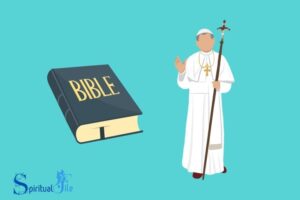Examples of Spiritual Wickedness in High Places: Abusing!
Spiritual wickedness in high places includes abusing power, manipulating beliefs for harm, and spreading harmful ideologies through religious groups.
Spiritual wickedness in high places refers to religious or spiritual authorities who misuse their power or influence for corrupt or harmful purposes.
This can manifest in many ways, such as cult leaders exploiting their followers, religious institutions covering up crimes or misconduct, or religious leaders using their influence to spread hate or bigotry.

Key Takeaway
8 Examples of Spiritual Wickedness in High Places
| Examples of Spiritual Wickedness in High Places | Brief Explanation |
|---|---|
| Manipulation of power for personal gain | This refers to individuals in positions of authority using their power to benefit themselves unjustly. |
| Selfishness in leadership | Leaders who only think about their interests instead of the welfare of the people they lead. |
| Promotion of oppressive systems | Leaders maintaining systems that oppress certain groups instead of promoting justice and equality. |
| Lies and deceit | When individuals in power spread false information or deceive others to maintain or increase their power. |
| Abuse of authority and unethical acts | This includes leaders who use their position to commit acts that are immoral or against societal norms. |
| Greed and materialism in office | Leaders who focus on accumulating wealth and material possessions at the expense of their duty to serve. |
| Unrighteous judgments and perversion of justice | When justice is skewed in favor of certain parties due to corruption or bias in high places. |
| Idolatry in leadership | This refers to leaders who put their desires, power, or other things above their duty to serve and honor God. |
Understanding Spiritual Wickedness
Spiritual wickedness is a concept with deep roots in religious and philosophical traditions. It refers to malevolent or morally corrupt behavior attributed to spiritual or supernatural forces.
Roots in Religious and Philosophical Contexts: Spiritual wickedness originates from beliefs in various faiths and philosophies. In Christianity, it’s associated with Satan and demons opposing divine will.
Buddhism and Hinduism acknowledge negative karma and malevolent spirits hindering spiritual progress, emphasizing ethical conduct as a remedy.
Prevalence of Spiritual Wickedness: Throughout history, spiritual wickedness is a recurring theme, seen in narratives of deception, temptation, and moral dilemmas in religious texts and folklore.
In contemporary society, it manifests as corruption, greed, violence, and unethical behavior, albeit not always explicitly linked to supernatural forces.
Impact on Society: Spiritual wickedness profoundly impacts society, leading to social discord, injustice, and suffering when individuals engage in morally corrupt actions. Extreme cases can result in violence, conflict, and moral degradation in various societal spheres.
Efforts to combat spiritual wickedness focus on moral and ethical education, promoting virtuous behavior. Many traditions stress self-awareness, self-discipline, and virtue cultivation as tools to resist malevolent spiritual influences and foster a more ethical and harmonious society.
Historical Examples
Throughout history, there have been numerous instances of spiritual wickedness in high places, where individuals in positions of religious authority or political power have exploited their positions for personal gain or manipulated the masses using religion.
Here are a few notable examples:
The Borgia Papacy (1492-1503): During the late 15th century, the papacy was marred by corruption and moral decadence under the reign of Pope Alexander VI, a member of the notorious Borgia family.
He used his position to accumulate vast wealth and power, often engaging in political scheming and nepotism. His actions exemplified how spiritual leadership could be tainted by personal ambitions.
The Salem Witch Trials (1692): In colonial Massachusetts, religious fervor and paranoia led to the infamous Salem witch trials. Religious leaders exploited the fears of the community, accusing innocent people of witchcraft and presiding over their trials and executions.
This dark episode underscores how religious authority can be used to manipulate and control individuals for personal or political reasons.
The Spanish Inquisition (1478-1834): Instituted by the Catholic Monarchs Ferdinand and Isabella, the Spanish Inquisition targeted those deemed heretical or politically inconvenient. It involved torture and persecution in the name of religious purity and political control.
Religious leaders played a central role in this oppressive campaign, using their authority to suppress dissent.
The Jonestown Massacre (1978): Led by Jim Jones, the People’s Temple was a religious cult that ultimately culminated in the mass suicide-murder of over 900 followers in Guyana.
Jones exploited his religious position to manipulate and control his followers, leading them to their tragic demise. This shocking event demonstrated the dangers of unchecked spiritual authority.
The Crusades (1096-1291): Several Crusades were initiated by religious leaders and political figures in Europe with the goal of reclaiming the Holy Land.
While there were undoubtedly sincere motivations among the crusaders, the campaigns also served as opportunities for personal enrichment and political maneuvering. Many leaders used religion as a pretext to further their own interests.
These historical examples caution us about the danger of spiritual corruption among those in authority, who may prioritize personal gain or political manipulation over the true welfare of their followers or adherents.
They underscore the need for vigilance and accountability in religious and political institutions to prevent such abuses of power.
Corruption Cases Involving Politicians And Spiritual Wickedness
Examples of spiritual wickedness in high places include corruption cases involving politicians. These instances highlight the unethical and immoral actions taken by individuals in positions of power, revealing the dark side of politics and the influence of spiritual wickedness.
These cases often reveal the depth of darkness that can infiltrate those in positions of power. In this section, we will explore two examples where politicians have been entangled in deceitful and occult practices.
Example 1: Politician A Involved In Fraudulent Activities
- Politician a was found guilty of embezzling public funds for personal gain.
- Through a series of elaborate schemes, they were able to divert millions of dollars into their own pockets.
- The corruption investigation revealed a web of connections between the politician, corrupt businessmen, and spiritual advisors.
- It was discovered that the politician had engaged in occult practices to seek supernatural protection and maintain their grip on power.
- These practices involved rituals, sacrifices, and the worship of dark entities.
- The diabolical alliance between the politician and the spiritual advisors allowed them to manipulate and deceive the public, leading to significant financial loss and the betrayal of trust.
Example 2: Politician B Linked To Occult Practices
- Politician b’s involvement in occult practices came to light during an investigation into a mysterious death.
- It was revealed that the politician had participated in secret meetings and rituals with a clandestine group known for their ties to the dark arts.
- The occult practices included summoning malevolent spirits and performing rituals aimed at influencing political outcomes.
- Politician b believed that supernatural forces could grant them political power and protect them from any potential threats.
- The investigation exposed the disturbing relationship between the politician and the occult group, raising questions about the true nature of their decision-making and motives.
- This revelation sent shockwaves through the public, eroding the trust and confidence they had once placed in their elected representative.
These two examples highlight the sinister connection between corruption in politics and spiritual wickedness.
It reminds us that power can tempt even the most seemingly virtuous individuals, leading them down a path of darkness and immorality.
As society grapples with these revelations, it serves as a warning to remain vigilant and demand transparency and integrity from our leaders.
Only then can we hope to combat the malevolent forces that perpetuate spiritual wickedness in high places.
Conclusion
In the journey of exploring spiritual wickedness in high places, we have delved into various examples that shed light on this troubling phenomenon.
We have examined how corruption can infect even the most powerful individuals and institutions, leading to the manipulation of economies and the erosion of democracy.
The hidden workings of secret societies have also been unveiled, illustrating the insidious influence they wield over society.






